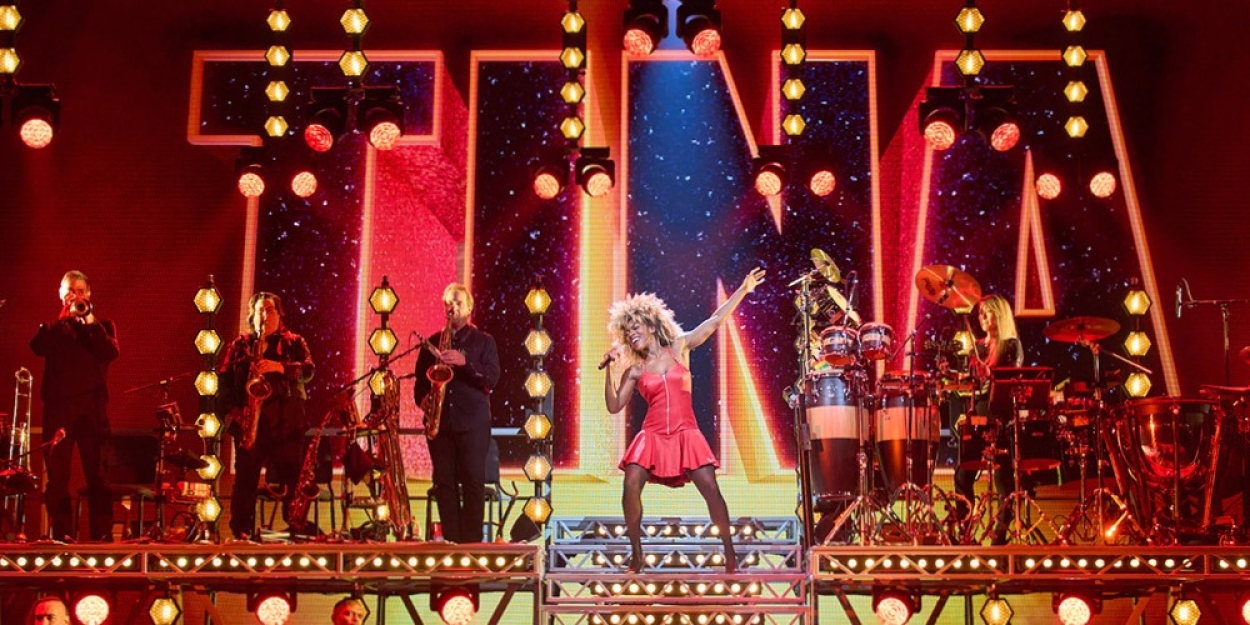Review: TINA Rocks and Rolls Down the River at Benedum Center
Now onstage at the Benedum Center!

Where my Schittheads at? If you binged the Canadian-American sitcom Schitt's Creek during the pandemic, like so many of us did, you undoubtedly had a little lump in your throat when Tina sang "(Simply) The Best" at the end of Tina... not because of Tina Turner's own rise, fall and rise back to fame and success, but because of that anthemic song's second life as a theme song for the Rose family. Even when the music in this Tina Turner biomusical is technically oldies, Turner's work still feels contemporary and current. Maybe it's because she picked great songs. Maybe it's because her unique, craggy energy has no equal or even analogue save maybe the equally idiosyncratic/virtuosis Axl Rose. Or maybe it's just because the songs have stayed in pop culture without ever becoming jokes or "of an era" signifiers.
What is "of an era," however, is the hyper-conventional jukebox biomusical, an era from about 2000 to 2019. During this age, musician after musician had their stories made into a fairly conventional, realism-based Broadway tuners. Luckily, director Phyllida Lloyd and book writer Katori Hall (working in conjunction with Frank Ketelaar and Kess Prins) buck some of the worst feet-on-the-ground trends and tropes of the genre, allowing Turner's story to exist in a more abstract and surreal world most of the time.
When we meet Turner (Zurin Villanueva) for the first time, she seems to be embodying the worst and most punchline-worthy musical biopic cliche of them all: "the singer must think about their whole life before playing a concert." But then Turner's meditative reverie fractures into a web of sound and vision, with ensemble members dancing with chairs like a slow-motion whirlwind. Around us are sounds and emblems of Turner's famous quasi-pantheist take on religion: Buddhist mantras, Baptist preacher's admonitions and Native American chants accompanied by a gourd shaker. Gradually things congeal into a magic-realist version of a church service; these touches of dream-meets-reality occur constantly throughout the show and keep it from feeling as quasi-documentarian as Jersey Boys or Beautiful.
Zurin Villanueva carries the whole show as Tina Turner, and she is a force of nature. She doesn't always embody the strange, compelling vocal eccentriticities that made Turner so famous; rather, Villanueva sings as the character of Tina and only summons the voice of the historical Tina at key moments so as to not feel like a caricature. Most of the show revolves around her portrayal, and she does not disappoint. She throws herself into the singing and wild dancing with aplomb; if the choreography and slightly zany physicality sometimes seems grotesque, it's because Tina Turner in action WAS slightly grotesque, and that was her charm. It takes a unique persona to be both a sex symbol AND a lifelong obsession for legendary eccentric John Waters, and Tina had the magic to be both at once.
As Ike Turner, understudy Antonio Beverly brings a preening charm with a dash of underlying menace to the smooth-talking dandy turned spousal abuser. Unfortunately, if Tina has one weak point, it's the staging of physical violence and aggression. The fight choreography, so central to a show about an abused woman gradually fighting back and brekaing the cycle, is rather loose-limbed and cartoonish, at times suggesting a church play or a Saturday Night Live sketch rather than a serious depiction of domestic abuse. (Could this be an intentional choice made by the production? Possibly, but if so it's a misguided one.)
One would be misled into thinking this is purely the Ike and Tina show (with honorable mention to Zachary Freier-Harrison, who channels Randy Feltface as ebullient record producer Roger Davies). But no, the real star is waiting in the wings for the grand finale: the Tina Turner Band, played by the orchestra and local musicians. Live musicians creep onstage now and then through the show, bobbing their heads unobtrusively while they play tunes during big dance-band numbers. But only at the finale does the full show curtain disappear, revealing the band in all its glory rocking out at maximum sound for a mini Tina Turner concert. It's the Broadway equivalent of the Live Aid show at the end of Bohemian Rhapsody. Surprisingly, when Tina invites the sax soloist to take center stage with her at the finale, it's just a normally-dressed guy from the band (who solos like an absolute champ, don't get me wrong); I had been almost certain we were going to see an actor portraying Tina's former sidekick Tim Cappello, better known by his nickname the Sexy Saxman. Maybe the image of a greased-up half-naked bodybuilder in bondage gear with a ponytail down to his waist has become too much of an eighties punchline thanks to The Lost Boys to make a suitable climax for a show like this.
Is Tina a perfect show? No. The plot drags a bit in Act 2, when Tina is free of Ike and must only struggle with rebooting her career and a slightly prefunctory new love story. But it's a fun show, an emotionally cathartic show at times, and a show full of an incredible band and cast playing incredible music. Not every swing lands exactly (repurposing Turner's suicide-ballad duet with David Bowie "Tonight" as an upbeat song about success), but the quirky twists and turns of Phyllida Lloyd's staging make it well worth checking out. When Jersey Boys, the jukebox show around which all others are orbiting, is playing just across town, Tina's relative weirdness is a breath of fresh air, "better than all the rest."
Reader Reviews



